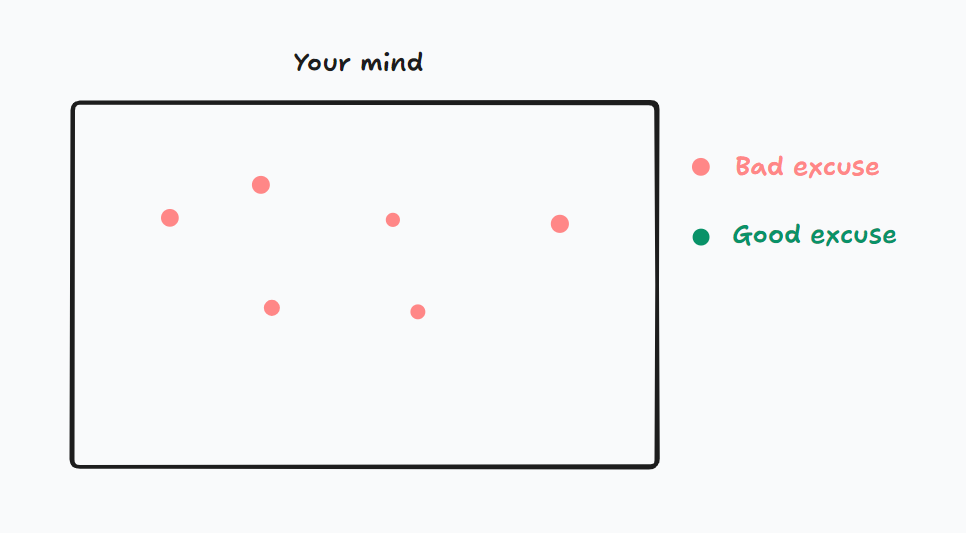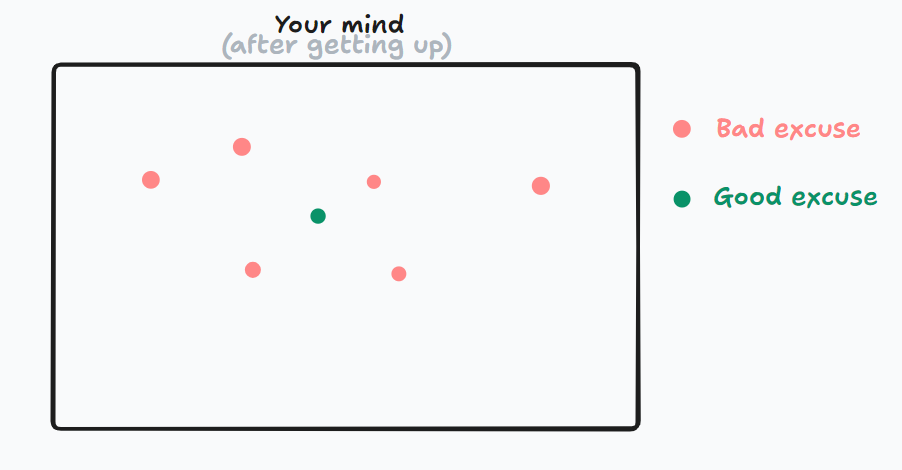On why the advice "if you want to leave a meeting, just start getting up" works
It's a clever mental trick; I argue once you understand how it works, you don't need to do it anymore
(I originally wrote this as an email to Steve Levitt. He seemed to like it so I’m sharing it & elaborating on it here)
There’s an episode of People I Mostly Admire that had the following advice: if you ever feel stuck in a meeting & want to leave, but you can’t come up with a good excuse, just get up. An excuse will come to you as you physically get up and head towards the door.
People have tried this and said it works. I have it tried, it works. It feels like magic! I did it the other day, while watching my mind, and I have a theory to explain it:
It works because it lowers your standard of what is an “acceptable” reason to get up and leave. It’s not magic, and more importantly, it doesn’t “bring the excuse into existence”. It just forces you to pick one that you’ve already thought of (consciously or subconsciously).
Does this sound familiar? This is exactly the same mechanism, I think, of why deadlines work. Deadlines don’t bring the work into existence from thin air. I think most would say it just forces you to put down what you have, even if you think it’s not good enough (and once you do that, you can iterate on it, and make it better).
I think this is important & generalizable. Let me draw you a picture.
Diagram of a mental model
This is how I used to think about it:
I keep coming up with stuff, none of them are good. I’m looking for one good excuse so I can say it, and get up and leave. But it never comes, and I never leave.
Then, magically, when I DO get up, I find it! I find the dot I’ve been looking for!
It’s incredible that I happened to find it JUST IN TIME as I needed it!
I think this model is incorrect however. I think what would have actually happened had you thought of that green dot, before getting up, is you would have considered it red.
The reason you consider it green is because it works; it objectively allows you to exit the meeting without anyone getting upset. Specifically, it is proven that it works before your mental filter gets a chance to evaluate it, and label it red. The fact this happens without you noticing is what leads you to think that you’re not able to find any ideas, when you’re actually coming up with a bunch of them, of varying degrees of quality.
Why you don’t need to keep doing this trick
This mental trick works because as you’re getting up, you say the excuse immediately that pops into your head, it doesn’t get a chance to be labeled as “red”, only for you to then realize you were wrong about it.
You never get a chance to correct your filter.
Specifically it means you’re not even consciously aware of your filter. What bubbles up to your awareness is only “good excuse”, “bad excuse”, not “here’s an excuse, let me ponder if it fits”. Your brain makes that decision for you (in literally, exactly the same way your brain makes decisions about balancing & pedaling when you ride a bike).
But, just like with breathing, you can consciously control an automatic process in your mind.
So here’s how I’ve gone about updating my filter:
It happens automatically for me, the labeling of “good” and “bad” idea, I can’t change this
But I do have control once it’s in my awareness. I can say, “wait, IS this a bad excuse? Why do I think it’s bad?”
Get feedback (preferably one that is convincing to all of you, not just your rational mind, about whether or not it was good. That the excuse works is the critical feedback step in that example)
If you do this over and over (it’s a bit exhausting) eventually you train the subconcious filter, to update it. The automatic labeling changes.
This is a bit like what they tell you to practice if you want to lucid dream (one trick is to check if you’re dreaming every half hour, until it becomes a habit you do automatically that carries into your dream).
What actually makes a good excuse?
I used to think this was just all about forcing yourself to say whatever pops into your mind. I think it’s a bit more nuanced than that. I think you DO want a filter! That’s a good thing. You just want it to be better calibrated.
In this case of leaving the meeting, a successful excuse is simply one that communicates: “I am leaving, and it is not because of something you did, I am not upset”. The content of the excuse doesn’t matter, but what it communicates does. If you leave without saying anything, that communicates: “I am probably upset”. This is why most excuses DO work (your tone of voice and delivery is really what communicates the important parts).
Applying this to deadlines
Consider this process re-deadlines & writing a paper or making slides. A mental filter that labels everything as “not right” means you’re stuck not writing anything.
NO mental filter means you’re writing stream of consciousness, noisy, no cohesion.
There is a middle path. For many of us a deadline helps us find it. The looming deadline lowers the standard. Your attention is still focused on making a good presentation, but your filter for “good” lowers. That means sometimes you put out something (1) that surprises you in how well it actually worked, or (2) something that dissapoints you, it’s not as good as you hoped.
Once you understand that this mental filter can be calibrated, that it changes over time and in response to the environment, AND that it is often below your awareness, I think a lot of things become clear.
For example: do you see how composing a novel on a typewriter, or on paper, may change the mental process happening beneath awareness? Many famous writers swear by this, they can’t write any other way. They don’t know why it works, but it works.
Example: explaining Raymond Chandler writing process in terms of this post.
But we can know why it works, with this process of introspection and testing. And we can learn to steer it, or understand where it steers us.






This is something I was very specifically taught in improv! There is a game called Freeze Tag where normally you decide to call 'freeze' to end the scene, take the body position of someone in the scene, and start a new scene. I always struggled with not having a good enough idea to start a new scene with.
Then we played a variation where you call freeze and then call someone ELSE to enter the scene. So while I was waiting for a good idea, someone called freeze and called me in. As I walked up, still anxious and clueless about what to do, my hands took the position of the previous person and I IMMEDIATELY knew what to do. It was such a snap change from feeling completely unprepared to having total conviction as if this is what I had planned all along.
As someone who generally still prefers system 2 planning, improv has been great for getting me to tap into my system 1 intuition :)